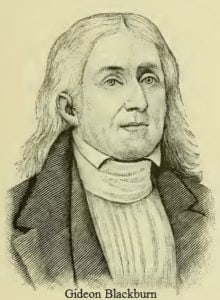Gideon Blackburn was born in Augusta County, Virginia, on Aug. 27, 1772. Blackburn’s young life was fairly uneventful until he was suddenly orphaned at the age of 11. After his tragic loss, he traveled to Washington County, Tennessee, to stay with relatives. According to the Tennessee Encyclopedia of History and Culture, it was during this time that he began his biblical studies at Martin Academy in Limestone, Tennessee. Blackburn excelled in his classes, gaining his preacher’s license in five years and becoming ordained by the Abingdon Presbytery of Virginia in seven. Thus at the young age of 18, Blackburn began his career as a minister.

Gideon Blackburn, 1772 – 1838
Following his ordainment, Blackburn established the New Providence Church in Maryville, Tennessee. He became well known as a powerful speaker, who served several congregations and was a successful landowner, establishing a farm and distillery close to Fort Craig, Tennessee.
After nearly a decade in Tennessee, Blackburn’s congregation had grown large. However, he found himself lacking in fulfillment. In the early 1800s he went to leaders of the church and state to search for funds to begin missionary work with Cherokee youth. In 1803 Blackburn even managed to hold a meeting with then president of the United States, Thomas Jefferson, who gave the funding.
Blackburn immediately set out and opened two schools in Tennessee, one in Bradley County and one in Hamilton County. These schools taught classes in English and Anglo-American customs as well as agriculture, mathematics and religion. These schools were very successful for their time but scandal struck in 1809. The Cherokee discovered Blackburn’s plan to ship whiskey illegally through the territories and it destroyed Blackburn’s reputation with the Native Americans.
Following the closing of his schools in 1809, Blackburn journeyed to Franklin, Tennessee, where he headed the Harpeth Academy and founded five separate congregations. In 1823 he moved once again to become the president and fundraiser for Centre College, according to the college’s website, and to be a pastor in Louisville, Kentucky. It was through his successful fundraising at Centre College that others began reaching out to Blackburn for help founding congregations and seminaries. One of the most notable of these requests came from a small town in Illinois called Carlinville, where Blackburn was asked to help fund a seminary.
In 1833, Blackburn accepted this request and journeyed to Carlinville to begin work on both the college and the founding of another two congregations. Four days short of his 66th birthday, Blackburn died on Aug. 23, 1838. However, the town named the school the Blackburn Theological Seminary in 1859. Later the seminary became what is known as Blackburn College.

